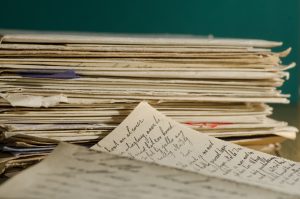
If you’re trying to determine if the handwriting or printing on your document is authentic or a result of disguise, then you should contact a professional document examiner. An expert examiner will help identify or eliminate your questioned documents.
Before contacting your examiner, it will help if you define precisely how they can help you!
Help Your Document Examiner by Defining the Assignment
Let’s start by discussing common scenarios that you may present to your document examiner. Let’s say that your client denies signing a contract. If they refuse to sign a contract, then this document is now pivotal to your case, and would potentially be helpful if it is fake.
Even if your client refused to sign the document, resist the temptation of sharing this biasing insight with your expert document examiner. Instead, frame the assignment by asking your examiner to determine whether or not your client signed the document. There is no need to disclose any details of the case unless they directly impact the signature in question.
Questionable Handwriting and Signatures
Here’s another type of matter that we see often. Uncle Jim lived a frugal life alone and carefully invested his money but failed to write a will. When he passes away unexpectedly, his siblings begin the process of sorting out his estate. While cleaning out his belongings, his estranged nephew (we’ll call him Bob) finds a handwritten will in his nightstand, leaving all he owns to this beloved nephew, Bob. The family is dumbfounded. They cannot understand why Uncle Jim would have done that.
In this scenario, we have handwriting and a signature in question. The assignment for this matter may have two parts. First, did Uncle Jim write the will and sign it? Second, did Bob write and sign the will? There are two potential writers and two examinations: one comparing the writing on the will to Uncle Jim’s handwriting; the second examination compares the will to Bob’s handwriting.
Prepare the Evidence for Your Professional Document Examiner
In either of the scenarios, the next step is to prepare the evidence for examination. Your expert will request the best copy of the documents to examine. The “best copy” is always the original document. However, often there are only photocopies available.
In the case of signatures, collect as many samples as you can find. It is especially important to provide samples dated about the same time as the documents in question.
For handwriting samples, be sure to look for comparable writing. For example, if Uncle Jim handprinted his will, find hand printing samples for both Uncle Jim and Bob. Likewise, if the will was written in cursive, look for cursive handwriting for both writers.
Next, place the original documents in protective sleeves and do not write on them. Also, refrain from highlighting or annotating the copies. Use “sticky notes” to identify which are samples and which is the document in question. Please write on the sticky notes BEFORE you place them on the original documents to avoid making indentations on the paper.
If none of your documents are original, your expert may have you send scans of the copies instead. Be sure to ask what format and resolution are preferred. Your expert will want to enlarge the images on the monitor, so a .tiff or .jpeg file may be preferred over .pdf.
Provide a Timeline for Your Document Examiner
Give your expert plenty of time to complete the analysis. Once the documents are received, they must be identified and organized before the examination can start. Your expert may find that she needs additional evidence to focus in on specific aspects of a writer’s habits, so allow time for stops and starts in the process. Let the expert know when you need your opinion and when (or if) a report is required. Unless we hear otherwise, your case will proceed in keeping with your deadlines.
Find the Right Expert Document Examiner
Choosing the right qualified Document Examiner may mean the difference between winning or losing your case. If you need assistance authenticating handwriting contact Forensic QDE Lab today. Linda Mitchell is a Certified Forensic Document Examiner and a dependable resource for your case. Give us a call at 888-760-0339 today or text 760-456-2503 with any questions!
